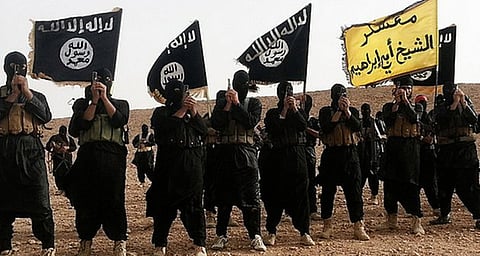Daesh is on its last legs, drawing its last breath
It is turning out to be a pathetic end to that gaggle of caliphniks whose leaders imperiously demanded allegiance from around the world

Will this be the last we’ll see of, hear from and — mercifully for columnists — write about Daesh (the self-proclaimed Islamic State of Iraq and the Levant), now worn out as a fighting force and discredited as a theological titan? Looks like it.
Consider this revealing, not to mention evocative headline of a news story in the New York Times last Sunday, datelined Hawija — a town reclaimed from Daesh by Iraqi troops in coordination with Kurdish forces — the last significant urban territory in the country controlled by the militant group: “[Daesh] fighters, having pledged to fight or die, surrender en masse.”
It would appear that more than a thousand Daesh terrorists, who fled this last stronghold of theirs, 140 miles (225km) north of Baghdad, voluntarily surrendered to the enemy instead of fighting “to the last drop of blood” and “to the last man”, as they had always boasted they would do. The news has shattered the image of Daesh militants as hardy shock troops given, at all times, to choosing martyrdom in battle over surrender to the enemy, and belied that much trumpeted bravado evinced by their leader after he officially presented himself in June 2014 as the new ‘caliph’.
Not only has the group suffered a string of humiliating defeats in their strongholds in Iraq and Syria in recent months, but their opponents have taken less time and less effort to inflict each one of these defeats on them. The fight for Mosul, for example, took nine months; Tal Afar, which fell next, took 11 days; and Hawija took a mere three days of actual heavy fighting.
In Syria, the battle for the group’s putative capital Raqqa — an ongoing battle that began last June, spearheaded by the United States-backed Syrian Democratic forces — is in its final stages. Moreover, downstream along the west bank of the Euphrates, in a separate operation mounted by the Syrian army and its allies, Daesh fighters, according to news reports, have collapsed, forced to flee across the desert to their last strongholds in the Euphrates Valley.
An undignified end to that gaggle of caliphniks whose leaders, upon declaring the establishment of a delusional ‘caliphate’ three years earlier, imperiously demanded allegiance from Muslims anywhere and everywhere around the world, wouldn’t you say?
Now couple that with the psychopathic brutalities that this group has committed since its inception — brutalities that ranged from decapitating Japanese reporters to burning alive Jordanian fighter pilots, and from enslaving Yazidi women to wantonly destroying cultural treasures — and you have a sick joke that sickens whomever you tell it to.
Oh, the horrors this group has wrought!
Perhaps one of the most horrific of these horrors is what Daesh combatants have wrought on their own — their own womenfolk and children, whom they had so callously brought with them, effectively to live in war zones, with no regard for the actual or potential dangers they exposed them to. In a report in the current issue of Foreign Policy magazine, filed by Belkis Will, we learn that since August 30, Iraqi authorities have been holding 1,400 foreign women and children who escaped from Daesh-controlled territories during the recent battles, especially around Mosul.
These vulnerable people, who together hail from 10 countries, including France and Germany, have surrendered to the military forces, who have shuffled them around different sites in Iraq. According to Will, the authorities, sadly, refuse to explain why they are being held (they are women and children, after all) and what they plan to do with them. Will, who interviewed several of them, wrote: “Mostly [these women] seemed exhausted, anxious and unsure of what would happen to them ... They face the risk of trial, torture and even the death penalty. There’s every reason to fear for the safety of these detainees”.
It is, of course, morally egregious, not to mention legally questionable under international law to punish someone for the alleged crimes of their spouses or their parents. But it must be admitted, at the end of the day, that these “spouses and parents”, shallow, uninformed and intellectually vacuous modern-day caliphniks one and all, have brought it all on themselves and their families.
A measure of what insipid knuckleheads these folks are — not the media-savvy sophisticates everyone at one time took them to be — was the claim by Amaq, the group’s “news agency”, that Stephen Paddock, the man behind the recent massacre in Las Vegas, a 64-year-old retiree from Mesquite, Nevada, was one of their soldiers. In Amaq’s narrative, not only had this (most probably disturbed) individual converted to Islam several months before, but that he had actually given himself a classically resonant Islamic name, Abu Abdul Barr Al Amriki, that is, the American parent of lover of the prairies.
And these are the schmucks who, over the last three years, have advanced their movement as a resurrection of Islamic civilisation in our time — and terrorised the world, East and West? Oh, Peleeeze!
And, yes, if Daesh will soon cease to exist, assuredly its imminent fate, then what is the group’s raison d’etre elsewhere. So let’s come to bury these buffoons and not praise them, for the evil they have done will, sadly, live on.
Fawaz Turki is a journalist, lecturer and author based in Washington. He is the author of The Disinherited: Journal of a Palestinian Exile.


